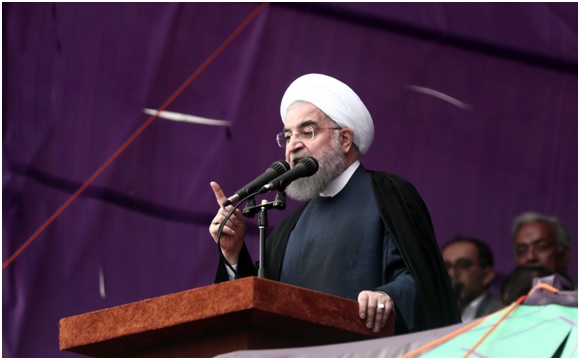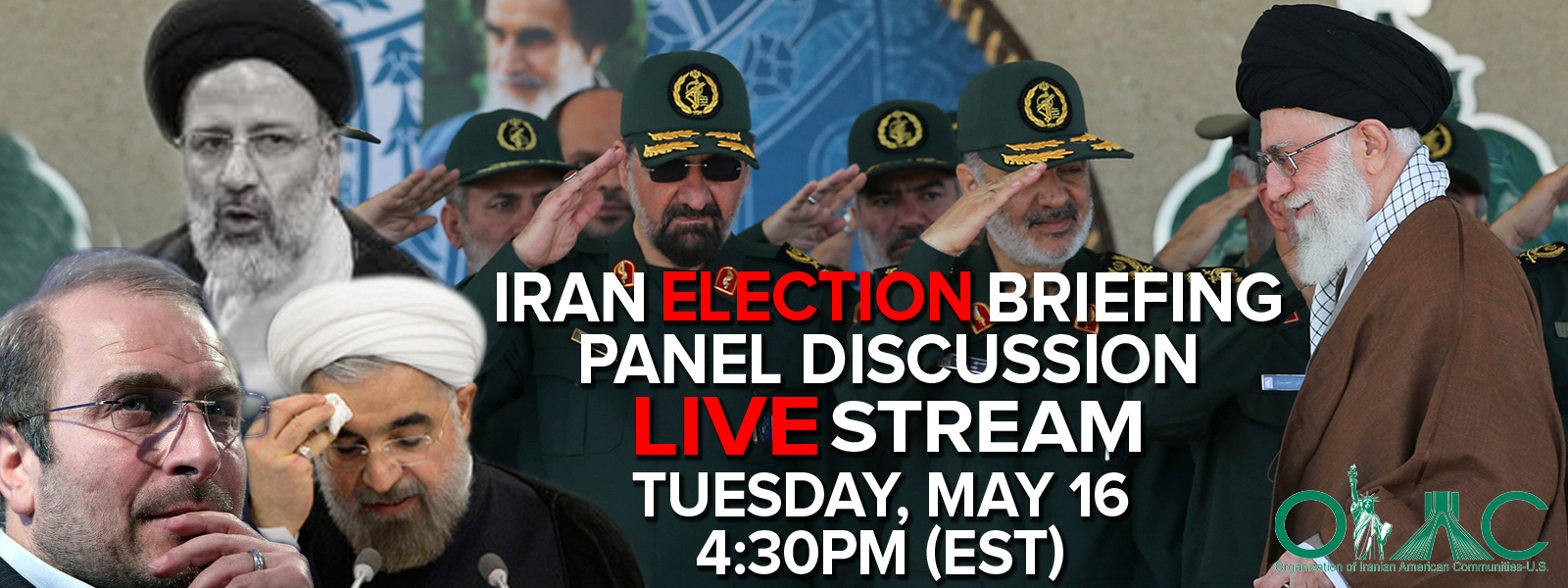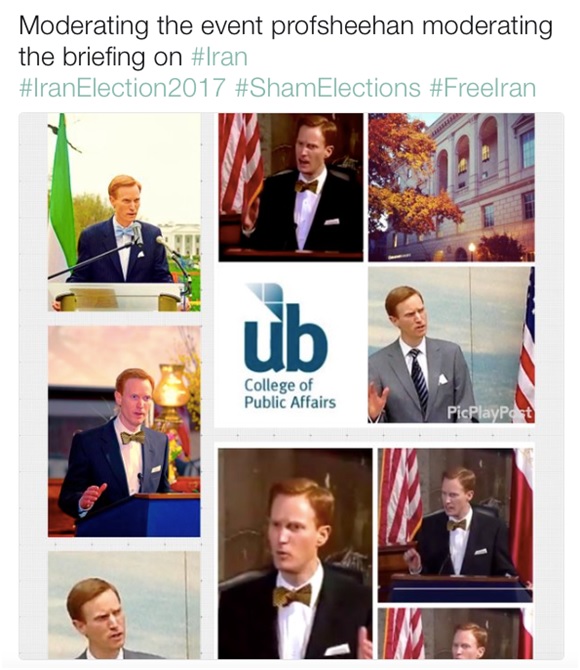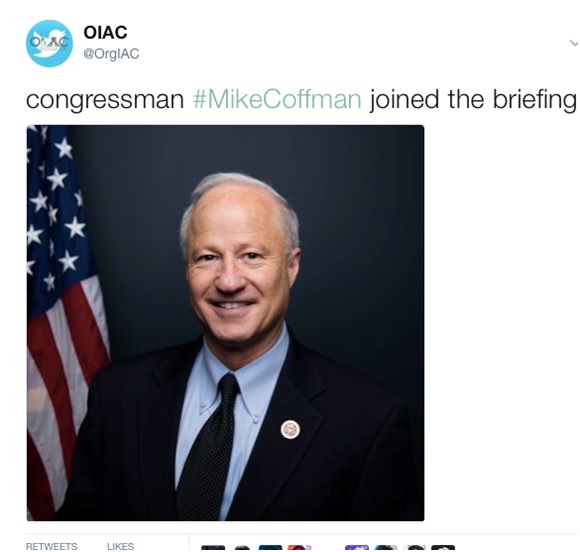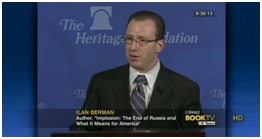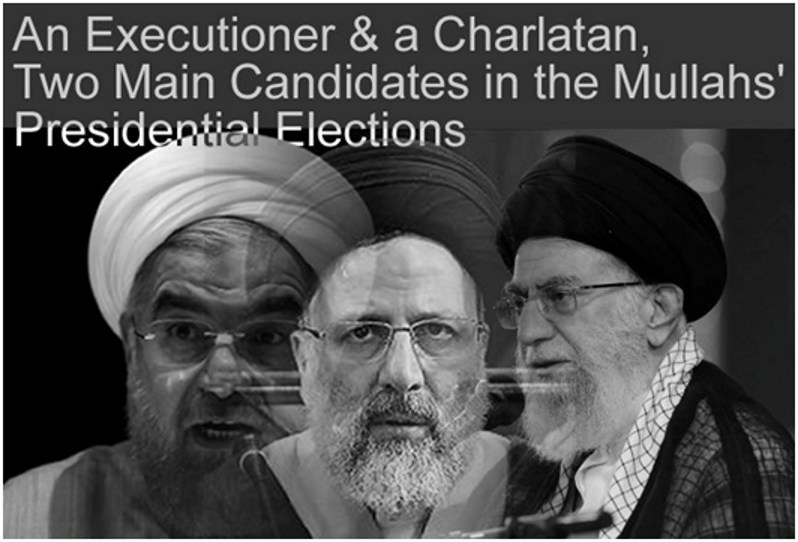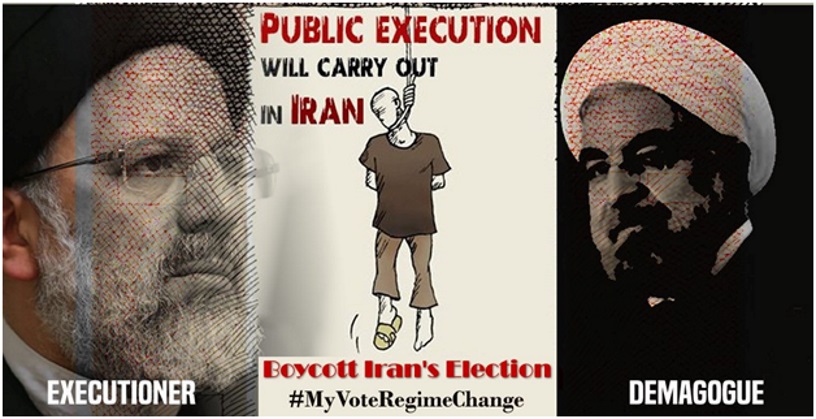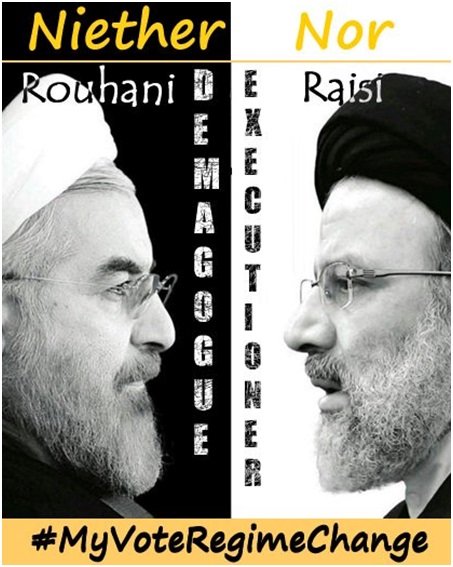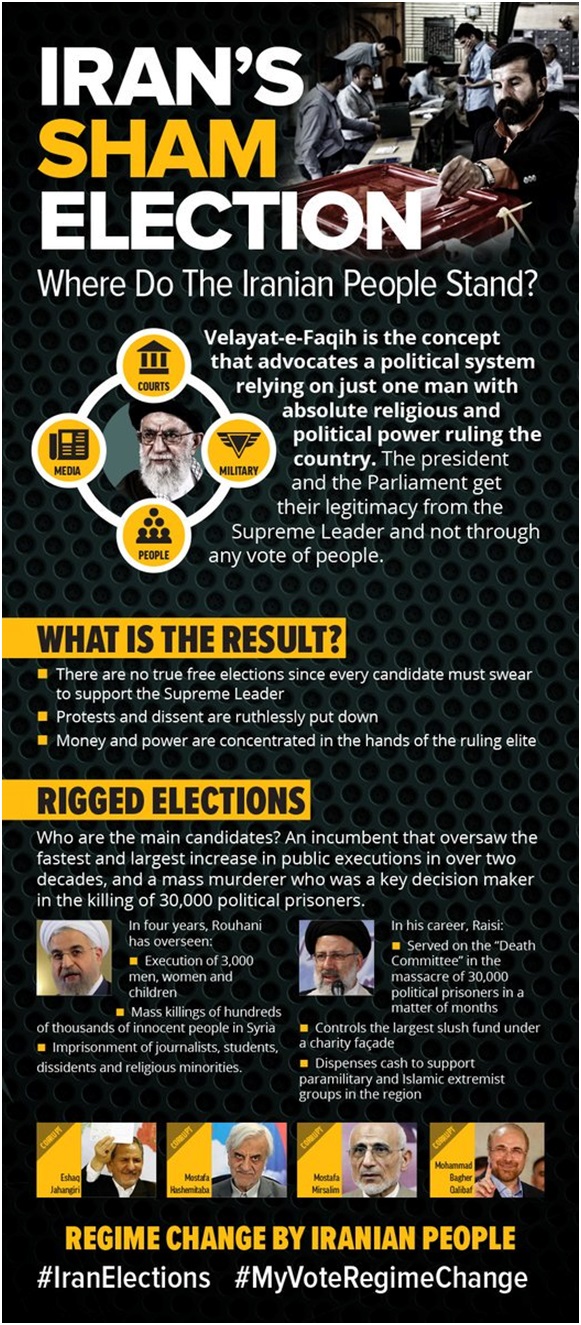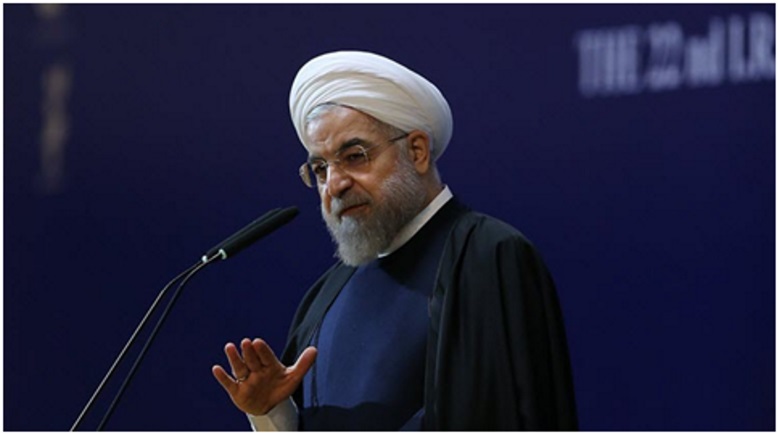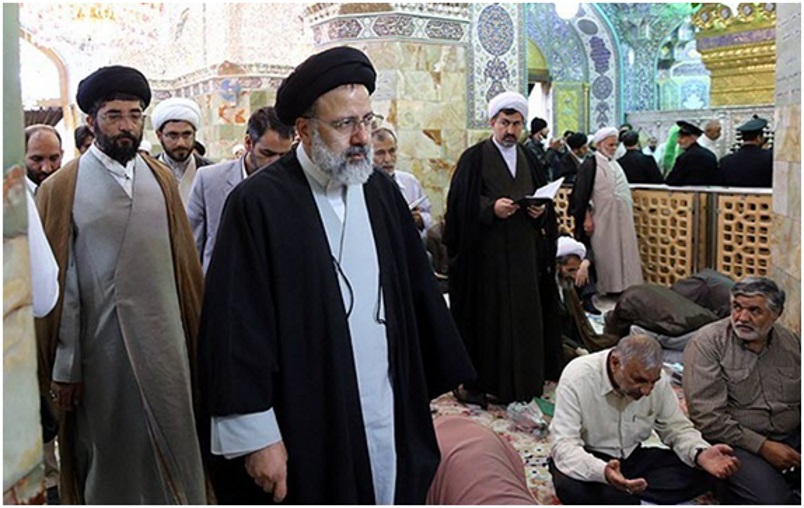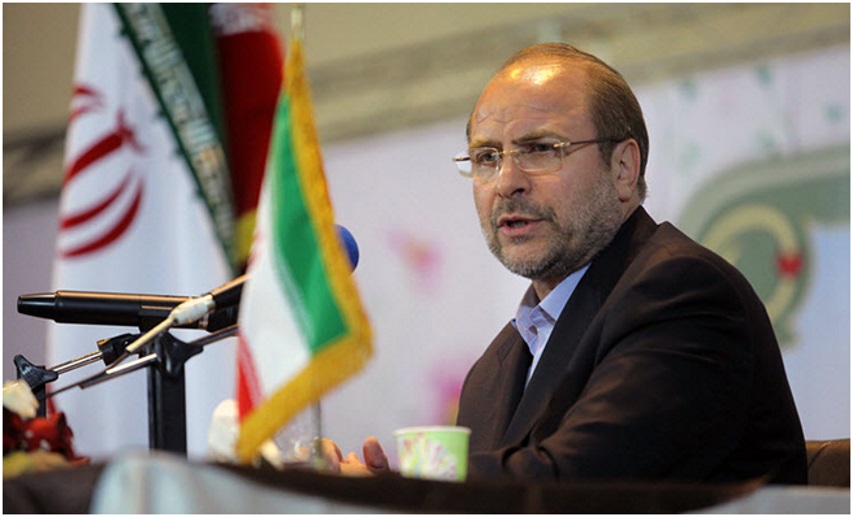Iran Election
Experts View
Trump’s Middle East Trip and Iran: How to Bring Peace?
05/23/2017 02:39 am ET
Donald Trump embarked on his first trip overseas as President on May 19th. Destination, Saudi Arabia, of all places. After all the controversy about campaign rhetoric regardingIslam and his executive orders on travelers from Middle Eastern countries, his choice of what he called “the heart of the Muslim World’ as his first stop on his first trip came as quite a surprise to many…more
Iran’s President Isn’t a Reformer. He’s an Enabler.
Don’t be fooled by Hassan Rouhani. He’s deeply complicit in an evil system.
By RAY TAKEYH
May 22, 2017
Hassan Rouhani, the newly re-elected president of Iran, is a creature of the Islamic Republic’s establishment, an apparatchik with much guile and little imagination. And yet Rouhani’s subversive political campaign may do lasting damage to the Islamic Republic. In the process of reclaiming his office, he shed light on the regime’s dark past and made fantastic promises that he has neither the ability nor the intention of keeping. Rouhani’s campaign alienated the regime’s power brokers and his tenure will inevitably disillusion his constituents. The Rouhani presidency will once more remind the Iranian people that the theocratic state cannot reform itself. more
20 MAY 2017 • 5:48PM
The re-election of President Hassan Rouhani changes nothing. Iran remains an impoverished dictatorship governed by a theocratic elite. The illusion of pluralism was given by the candidacy of hardliner Ebrahim Raisi, who in the late Eighties allegedly sat on a commission that approved the execution of thousands of political prisoners. Mr Raisi favoured a tougher stance towards the West, it was claimed, but Mr Rouhani’s own diplomatic efforts can only have been possible because the clerics approve of them – so the contest of ideas was moot from the start. more
The Outlook Of Rouhani’s Second Term As Iran’s President
CONTRIBUTOR
MAY 20, 2017
The incumbent Hassan Rouhani has been selected, not elected, to a second-term as the mullahs’ president in Iran. At 12:30 pm local time reports from inside Iran announced the near final results, claiming nearly 40 million casted their ballots, with around 23 million voting for Rouhani and 15.5 million for his main challenger Ebrahim Raisi, a senior cleric known for his close relations with the Supreme Leader Ali Khamenei and believed by many to be his preferred candidate for the role.
With Rouhani set to start a second term, his promises of improving the economy and the human rights situation, will be placed to test. His first tenure, however, was riddled with many un-kept pledges, following a history of Iranian presidents failing to deliver on highly boasted promises. more
Iranian election is a sham and a ‘joke,’ government opponents say
Ben EvanskyPublished May 17, 2017
This week’s presidential election in Iran has activists from outlawed opposition groups risking their lives, they say, in what they have branded as an unfair and undemocratic election.
Activists claim that no matter who wins the presidential contest, Iran’s Supreme Leader, Ayatollah Ali Khamenei, will continue to control his country.
“Calling this an election is a joke. This is a farce, and not an election,” Hamid D, a mechanical engineer in Tehran, told Fox News. Hamid, who did not want to use his last name for fear of retaliation, said he has been busy the past few weeks putting up anti-regime posters all across Tehran. more
What Does Rouhani’s Second Term Mean?
May 19, 2017
- The Washington Post Editorial, “Real transformation in Iran will require a collapse of the Islamic Republic.”
- Public outrage against 1988 massacre reached so high that even many powerful figures within Khamenei’s faction were not prepared to address and support it.
- Rouhani, February, 2017, “If our forces did not fight in Baghdad, Samarra, Fallujah and Ramadi, and if they did not help the Syrian government in Damascus and Aleppo, we would not have had any security in order to be able to conduct the [nuclear] negotiations so well,”
- Rouhani acknowledged that the ruling faction “during 38 years only knew how to execute and imprison people,” however, at the same time Rouhani praised Khamenei and publicly announced that he is willing to kiss the ring of the “exalted leader” dozens of times.
The incumbent Hassan Rouhani has been selected, not “elected,” to a second-term as the Iranian regime’s president, as announced by the officials today, Saturday, May 20, 2017.
The regime, not surprisingly, claimed a large voter turnout, but reports and video clips by the network of the Iranian resistance in various cities in Iran, as well as journalists, who managed to visit unassigned voting stations, suggest that a large portion of the population had stayed away from ballot boxes.
The campaign this year attracted greater public attention to the 1988 massacre of 30,000 political prisoners, mostly members of the main Iranian opposition, the Mujahedin-e Khalq (MEK). Public outrage against Rouhani’s rival, Ebrahim Raisi, over his role in the massacre reached so high that even many powerful figures within Khamenei’s faction were not prepared to support Raisi, to the Supreme Leader’s dismay.
Rouhani’s first four years saw over 3,000 executions and an intense crackdown, rampaging poverty and injustice on the domestic scene; and intensifying foreign meddling and skyrocketing military/security budgets alongside efforts to advance the regime’s ballistic missile drive.
Funds gained as a result of the nuclear agreement were used to fuel wars in the region and increase military and security spending. Rouhani’s Defense Minister, Revolutionary Guards Brigadier General Hossein Dehghan, in his remarks two weeks ago, described Rouhani’s tenure as “the most glorious period in development of missile and defense programs of the country in terms of both quantity and quality.” He added that until March 2017 “credit guarantees for defense grew by up to 2.5 fold compared with the previous government” and “it will increase up to four fold by March 2018 relative to the previous government.”
Rouhani openly boasted in February 2016 that the regime’s presence in Syria and Iraq was used as leverage to gain concessions during nuclear talks. “If our forces did not fight in Baghdad, Samarra, Fallujah and Ramadi, and if they did not help the Syrian government in Damascus and Aleppo, we would not have had any security in order to be able to conduct the [nuclear] negotiations so well,” Rouhani said.
Rouhani would try in his second term, as in the past, through deceit and hollow promises, to present himself as the key to the problems. However, this would be rapidly discredited when faced with people’s expectations and demands. Iranian people know well that in Rouhani’s second term massive economic and social destructions along with political suppression would continue. Rouhani neither wants, nor is able to seriously alter the foundations, structure or behavior of this historically backward regime. In early May, Khamenei warned, “Gentlemen, please note that a change of behavior is no different from regime change.”
Although Rouhani acknowledged that the ruling faction “during 38 years only knew how to execute and imprison people,” but at the same time he praised Khamenei and publicly announced that he is willing to kiss the ring of the “exalted leader” dozens of times.
This is of course not unusual from Rouhani who for nearly four decades has held the highest positions in the regime’s security and military apparatus in domestic suppression and war mongering; he even called for public hanging of conspirators at Friday prayers to demonstrate the regime’s resolve in dealing with opponents.
“Khamenei’s failure to manipulate the election result to bring Raisi out of the ballot box and make the regime monolithic is a heavy blow for him and a sign of the regime’s approaching demise,” Maryam Rajavi, the president-elect of the National Council of Resistance of Iran said, adding, “Crisis has precipitated at the leadership level of the religious fascism and would continue until the regime’s downfall. The heightening power struggle is a reflection of the regime’s strategic failure in resolving the most pressing social problems and growing discontent.”
The take away from the 2nd term of Rouhani is that no change should be expected in the policies and behavior of the Iranian regime; the regime is more divided and thus weaker and more vulnerable; and the organized opposition has gained much more public standing. As evident in their sentiments expressed in the run-up to the election farce, the Iranian people see the overthrow of the religious tyranny by the Iranian people and the organized opposition as the only solution to Iran’s problems.
As the Trump administration reviews its policy on Iran, the will of the Iranian people, voiced by their organized opposition, should be taken into account, as a central element of the new policy. This is the only way to break the cycle of failed attempts to nearly four decades of Iranian regime’s threats and violence.
Lawmakers, Iran experts reject Iran election as a sham, urge support for Iranian people
WASHINGTON, May 18, 2017 /PRNewswire-USNewswire/ — In a briefing on Capitol Hill, sponsored and organized by Congressman Tom Garrett (R-VA) and the Organization of Iranian American Communities-US (OIAC), entitled “Iran Presidential Election: Status Quo or Change,” lawmakers and scholars rejected the May 19 election as a sham, which is neither free nor fair and called on the international community and the U.S. to stand with the demands of the Iranian people.
Representatives Garrett, member of the HFAC, and Mike Coffman (R-CO), a member of the HASC, Dr. Ilan Berman, Lee Smith, Alireza Jafarzadeh, and Prof. Ivan Sascha Sheehan joined the panel discussion.
In his opening remarks, OIAC Political Director Majid Sadeghpour, thanked Rep. Garrett for his attendance at this event, and welcomed the panelists.
In his remarks, Rep. Garrett said that the election will not bring any change and expressed the hope that the U.S. would avoid policies, which would “avoid things like the 1988 dissident massacre,” or the opportunity lost in the 2009 uprising “where the United States sat idly by.” He said the Iranian people desire “democracy and self determination.”
Rep. Coffman said that it is a tragedy that candidates in the Iranian regime’s election have “to go through a vetting process through the religious leaders of the country.”
“Election is a tool designed to achieve the appearance of legitimacy while reinforcing the regime’s hold on power,” said Prof. Sheehan, who moderated the panel.
NCRI’s Deputy Director Jafarzadeh highlighted the recently-published book by the NCRI-US, entitled, “Presidential Elections in Iran: Changing Faces, Status Quo Policies,” underscoring, “We’re talking about selections in Iran versus elections, but as we all know the vast majority of the Iranian people stay away from the ballot boxes as they have always done.”
Dr. Berman emphasized, “The faces may change, the names may change, and you sort of see that a little bit in the current cycle, but every person, regardless of what they say, is part of a broad continuum of Khamenei’s thought.”
In emphasizing the need to impose sanctions on the regime, Lee Smith added, “If people want to know what this regime looks like, look at Syria, look at Yemen, look at what’s happening in the Persian Gulf, look at what’s happening in the Red Sea. Look at how much money the IRGC makes. Look at what Hezbollah is doing around the world.”
To view the original version on PR Newswire, visit:http://www.prnewswire.com/news-releases/lawmakers-iran-experts-reject-iran-election-as-a-sham-urge-support-for-iranian-people-300460519.html
SOURCE Organization of Iranian American Communities – U.S. (OIAC)
“But real transformation in Iran will require a collapse of the Islamic Republic”
By Editorial Board May 18 at 7:51 PM
IRAN’S PRESIDENTIAL election on Friday is a familiar contest between a relative moderate, the incumbent Hassan Rouhani, and a hard-line conservative backed by the Revolutionary Guard and, it seems, Supreme Leader Ayatollah Ali Khamenei. It’s not correct to say the difference between them is insignificant: Mr. Rouhani, embraced by Iran’s educated middle class, favors more relaxed enforcement of Islamic rule at home and engagement with Western investors abroad, while opponent Ebrahim Raisi is a populist who rails against foreign influence and predicts the “Zionist regime” of Israel will be “wiped . . . from Jerusalem.”
From the U.S. point of view, however, it’s not clear that there’s a side to root for in what will be the 12th presidential election since the 1979 revolution. Both candidates have promised to stick with the 2015 deal that froze Iran’s production of enriched uranium and other nuclear activities for about a decade. And both appear committed to Iran’s aggressive bid for hegemony in the Middle East by other means, including military interventions in Iraq and Syria, support for rebels in Yemen and harassment of U.S. ships in the Persian Gulf.
Mr. Rouhani’s bet has been that Iran can wage those wars while simultaneously boosting its economy with lucrative investment and trade deals. So far he’s been half-right: Iran has doubled its oil exports since the nuclear deal, boosting economic growth to more than 7 percent. But big Western banks and investors have largely stayed out of Tehran, in part because of lingering U.S. sanctions. The government has consequently been unable to finance big infrastructure projects, and ordinary Iranians have seen few benefits. Unemployment remains stuck at more than 12 percent.
Read These Comments
The best conversations on The Washington Post
Sign up
The president has meanwhile had no luck reining in the judiciary or Revolutionary Guard at home. At least four U.S. citizens, along with several other Westerners, are being held as de facto hostages by these factions, further depressing the appetite of would-be investors. Though he has been endorsed by the leaders of the 2009 Green Movement, Mr. Rouhani failed to deliver on his promise to have those leaders released from years of house arrest.
The 2009 uprising was triggered by the apparent manipulation of a presidential election. This year, Iranians appear unlikely to surge into the streets even if Mr. Khamenei fixes the vote in order to install Mr. Raisi, who is rumored to be a potential successor to the 77-year-old supreme leader. Mr. Rouhani does not offer genuine democratic change and thus lacks the popular support garnered by 2009 candidate Mir Hossein Mousavi or former president Mohammad Khatami.
Some observers of Iran calculate that the West would be better off with a victory by Mr. Raisi, who would likely return Iran to international isolation and fuel domestic discontent. The nuclear deal was essentially a bet by the United States that Iran would change over a decade and lose its appetite to pursue nuclear weapons. The Obama administration supposed that the kind of economic opening promoted by Mr. Rouhani would bring about that change. But real transformation in Iran will require a collapse of the Islamic Republic. A victory by Mr. Raisi would frustrate Iranians hoping for change in the short term, but maybe bring a reckoning for the regime closer.
Location: House Rayburn Bldg-Room 2255
Date: Tuesday, May 16, 2017
Time: 4:30pm-6pm
Panelists:
Bi-Partisan Members of Congress and Iran Experts, including:
Ilan Berman is Senior Vice President of the American Foreign Policy Council in Washington, DC. He is an expert on regional security in the Middle East, Central Asia, and the Russian Federation. He has been called one of America’s “leading experts on the Middle East and Iran” by CNN.
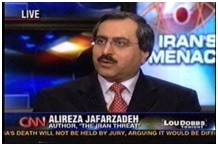


Iran’s presidential elections are scheduled to take place on Friday May 19, 2015. The leading challenger to the incumbent president Hassan Rouhani is Ebrahim Raisi, who has a checkered history of his own. In short, Iran’s sham presidential elections are less about elections but more about selection of a figure best suited to execute the supreme leaders’ hegemonic and often medieval directives.
Some in the West are still pinning hope on a transformative moderation within the Iranian regime, even as its policies and behaviors continue to exude extremism and violence. The regime’s brutal suppression of the Iranian people and Rouhani-led government’s ongoing criminal interventions in Syria are not to be forgotten.
Notwithstanding the former, Ebrahim Raisi is not only a candidate, hand picked by the supreme leader, but also a member of the “death commission” responsible for the 1988 massacre of over 30,000 political prisoners.
OIAC and its network members, California Society for Democracy in Iran and Iranian American Community of Texas, are co-sponsoring a briefing in the U.S. House of Representatives about the Iranian presidential elections and whether the outcome will make any difference in the lives of Iranians at home as well as the regime’s foreign policy.
Views on Iran Election
Iran Presidential Elections Heating As People Denounce Entire Façade
Videos Appear to Defend Raisi’s Role in 1988 Massacre
The nuclear deal takes center stage as Iran’s election campaign gets underway
Iran Election’s Theatrics, Frank Discourse Push Boundaries
Iran “Election”:
Answers to your 10 questions
1: Why it is important:
The mullahs’ sham presidential election will be held on May 19. This election is taking place at a critical time that is rare in the history of the regime.
Three major factors form the calculations of Ali Khamenei, the regime’s Supreme Leader, regarding who he will select as President:
- Internal factor: Fear of the uprising and repeat of the events of 2009 and desire to prevent similar events.
- International factor: Policy vis-à-vis the US. The question in front of Khamenei is that in dealing with the US, whether the regime intends to back off and accept other JCPOA type deals or to stand up even with the cost of a confrontation.
- Within the regime: The problem of succession in the supreme leadership. Although this issue is not publicly debated in the regime, it undoubtedly has a major effect on Khamenei’s decision as to who will be the President.
2: Who can run?
The nature of elections in Iran is different from democratic countries. The Constitution denies the possibility of an election under recognized international standards. Article 91 outlines the formation of the “Guardian Council” (GC) which is comprised of six theologians appointed by the Supreme Leader and six jurists appointed by head of Judiciary, who is appointed by the Supreme Leader.
Article 99 assigns the Guardian Council to supervise any election held in Iran.
Even those whose adherence to the regime is approved in the first set of screening by including by the Ministry of Intelligence will subsequently be vetted by the Guardian Council.
Election law stipulates that candidates must “believe and adhere to Islam and the sacred system of Islamic Republic in practice,” and “express loyalty to the Constitution and progressive principle of Velayat-e Faqhih” (or absolute rule of religious leader).
On October 5, 2015, Ahmad Janati, the Secretary of the GC went further and stated that belief and adherence must be “whole-hearted.”
Article 26 of the Constitution stipulates that political parties must not violates “Islamic laws” and Article 27 allows assembly and gathering only if “they do not violate Islamic principles and foundations.” Accordingly, no opposition group can exist within the country and as such no opposition is participating in the election. In other words, this is an election only within the regime and among those loyal to the system.
In 1991 the GC published its interpretation of its role regarding the elections by stating that “supervision mentioned in Article 90 of the Constitution is approbative and covers all stages of elections including approval or disqualification of the candidates.”
Therefore, even within the regime and among those who believe in the system and are loyal to the Supreme Leader, only those who can prove that their belief and conducts are whole-heartedly in line with the absolute rule of the Supreme Leader can participate in the election.
3: Why it is called “Selection”?
As mentioned above, the first fact that should be considered is that the elections in Iran are neither free nor fair. Elections in the clerical regime is power sharing between various factions of the brutal regime of Velayat-e-Faqih. Total power remains in the hands of one mullah and elections have no resemblance to modern democratic society. In this regime, all the candidates pass through the Guardian Council. Half of the members of the Guardian Council are directly selected by the supreme leader and the other half are appointed by the Judiciary chief, who is himself appointed by the supreme leader. Anybody who has the slightest rift with the supreme leader’s system cannot possibly run.
The important reality is that, unlike other places where free or even semi-free elections are held, there is no opposition in the mullahs’ elections. Elections are only meaningful when there is an opposition. In the clerical regime, the only ones able to participate in the elections are those who are part of the ruling circle, and both factions are part of the regime.
It is interesting that candidates in the upcoming election, including Hassan Rouhani and Ibrahim Raeisi, are running with the approval of Khamenei. Mohammad Reza Nematzadeh, Minister of Industry and Mining under the incumbent Rouhani, said on April 8: “One day Rouhani said in the cabinet ‘I discussed with Khamenei what is best to do? Should I come or not? He insisted that I should be present and I should be a candidate’. I am sure, if the Leader would have said “no, it is not good,” he would have accepted. Without explicit permission of the leader, he does not decide on major issues.”
On March 21, fifty mullahs of the Assembly of Experts sent a letter to Khamenei asking for approval of Raeisi’s candidacy and pointing out that Raeisi had said he would come to the scene only with Khamenei’s approval. Only after the approval of Khamenei did he announce his candidacy.
4: What is the power the president?
The Iranian president under the Velayat-e-Faqih system, should not be compared with the American or French President. Based on the constitution of the regime, much of the authorities and powers envisioned for the President in these countries, are among the powers of the supreme leader in Iran. One must note that the authority of the Supreme Leader is so absolute that the limited powers of the President as defined in the constitution can easily be overruled by the Supreme Leader. Any flow of state of affairs in the clerical regime is in the hands of Khamenei, his office, and the Iranian Revolutionary Guards Corps (IRGC) and its Quds Force. Mohammad Khatami, the so-called moderate President of the regime between 1997 and 2005 said in the last years of his presidency that “we are just facilitators of the regime”.
5: what is unique about all candidate?
The presence of two or more factions within the regime in no way represents individuals or factions that represent different sectors of society as in Western countries. They are fascist and criminal gangs within the ruling leadership. The common point of these factions is that they all have been involved in terrorism abroad and killings inside Iran from the outset. What takes place in the so-called election is that they get into the infighting over their share of power and a greater share of the plundering of the people’s property. Now that the regime is in a fragile state and faces social, regional and international crises, it is completely natural that the infighting within the regime has intensified and the crisis within the regime has deepened. Increased infighting is not due to two natures or two different thoughts. It is first of all a reflection of the failure of the regime in solving social problems and increased dissatisfaction. Differences are over how to save the regime from these crises. Each side tells the other side that continuation of this path leads to the fall of the regime.
6: What affects the current presidential elections?
- First – A year and a half after the JCPOA, and despite a series of unjustified concessions from the US and the West that the regime received, it failed to solve any of its fundamental problems. Instead, by laying down a nuclear weapon, even temporarily, the regime in its entirety and Khamenei in particular were weakened and their internal crisis has been intensified. Capitalizing on the JCPOA, Rouhani wanted to consolidate his position in the regime. Yet despite the nuclear deal and despite all the illegitimate and unjustified concessions that Obama gave to the regime, the nuclear deal did not solve anything. As far as the Iranian people are concerned, they got no benefit from the JCPOA. Rouhani failed to fulfill any of the promises he made and there has been no improvement in economic and social terms. Thus, he is a totally failed element.
- Second – With Obama’s departure, the clerical regime lost major backing in the international scene and is completely aware that it has entered a new era, which makes it strongly concerned about the policies of the new government. Obama’s regional strategy was based on a compromise with the regime, therefore with Obama’s departure, the clerical regime is particularly weakened in regional balance.
- Third – Complete transfer of thousands of PMOI members from Camp Liberty and Ashraf in Iraq to European countries shocked the regime. The regime failed, in spite of heavy investment and the use of all its means and resources, to massacre PMOI members or to force them to surrender, and this was a major blow to the regime. The presence of an organized resistance with widespread social roots within Iran is a major factor that the regime must seriously consider in its calculations.
- Fourth – The death of former President Ali Akbar Hashemi Rafsanjani on the one hand has weakened the regime in its entirety and on the other hand has left the Rouhani faction without support, giving Khamenei a freer hand to consolidate his rule.
7: What is Khamenei’s red line?
Khamenei’s main red line is the uprising of the people. The regime officials have warned for months about the threat of such an uprising. In the clerical regime, organized fraud designed to bring the desired candidate from the ballot boxes is called “electoral engineering”. Khamenei has the power of engineering the election to the extent that infighting of various factions do not lead to sparking an uprising. Internal analysis and evaluation of the regime is that if the uprising begins in spite of all the measures which the regime has applied for several years this time the regime will not be able to control it, and the repetition of scenes such as the 2009 uprising will seriously challenge the regime in its entirety.
8: Who are the two main candidates?
Ibrahim Raeisi, has been in the judiciary since the beginning of the clerical regime, issuing death sentences. At the age of 18, he was assistant prosecutor and at 19, he was a prosecutor of the regime’s revolutionary courts. He was one of the officials on the death committee that implemented Ruhollah Khomeini’s fatwa for the massacre of PMOI members in 1988. In this massacre, 30,000 political prisoners were executed. Ali Hossein Montazeri, then Khomeini’s successor, met with Raeisi and the rest of the death commission 20 days after the start of the massacre and told them that these executions are the biggest crimes of the Islamic Republic. An audio recording of the meeting was released after 28 years. In it, Montzaeri talks about the execution of pregnant women and 15-year-old girls during the massacre. According to some reports, Raeisi was the most brutal and the cruelest person on the death committee. He was completely trusted by Khomeini for inhuman punishments, including amputations. He later said that anyone who protested during the 2009 uprising was Mohareb (at war with God) and should be executed. His highest credit in the regime is his brutality, particularly in the massacre of the opposition, chiefly the PMOI. Raeisi must be tried as someone who has the greatest responsibility for crimes against humanity.
Hassan Rouhani has been in the decision making centers of the regime from the outset and has been directly involved in all of the crimes of the regime including repression, war and sending young kids and juveniles to the minefields. He admitted he was involved in the suppression of the popular uprising in 1999. He remained silent about the massacre of 1988 and over the years has shown no evidence suggesting distancing himself from it and thus has practically expressed his support. Three thousand people have been executed during his presidency, and he described the executions as the implementation of divine law. According to a UN report, the human rights situation deteriorated sharply during his presidency in various fields. In four years of his presidency, he repeatedly and explicitly supported Bashar al-Assad and the massacre of the Syrian people and the regime’s missile tests. Despite all claims about the economic recovery, despite the nuclear deal, the economic situation has been considerably in regress. And previous to holding the presidency, Rouhani admitted to deceive the West over the Iranian nuclear program. The difference between Rouhani and Raeisi is that he has combined brutality with deception.
9: What message does Raisi have?
As mentioned above, Khamenei brought forth Ibrahim Raeisi as a presidential candidate after much consideration. This is in line with Khamenei trying to advance the line of contraction of the regime and implement his consolidated power, and to continue, as far as he can, policies involving the exportation of terrorism and fundamentalism, regional intervention, and repression, because he sees this as improving the chances of the regime’s survival. This process inevitably will intensify the differences within the regime during the elections.
10: What are the prospects?
Given the situation that the regime in its entirety is facing, Khamenei has no simple or cost-free choices. This has created an almost unprecedented situation with two tracks and two overall visions for the supreme leader:
- If Khamenei succeeds and can do the necessary engineering, getting Raeisi as the President, this regime will have much smaller base. Such a surgery will have defections from within the regime and increasing discontent. On the other hand the international community will know better than ever that reforms, moderation and regime change from within are absolutely a mirage
- If Khamenei’s engineering fails and for any reason he fails to make Raeisi president, the dispersion within the regime increases even more. Khamenei as the supreme leader will have been weakened and will be in a weaker position to choose a successor. On the other hand, his weakness causes escalation of the crisis between the factions over the division of power. At this point the absence of Rafsanjani becomes more obvious and dispersion peaks and the totality of the regime will face a major crisis.
With Iran’s presidential election looming close, there’s a lot of debate and controversy over who is going to occupy the country’s top political role. With tight restrictions on candidates, a supreme leader who can override the results, and institutions that can manipulate the popular vote, there’s not much to say about the credibility of Iran’s presidential elections.
Nonetheless, it doesn’t hurt to know who might be at the front of Iran’s showcase of politicians for the next four years. Here’s what you need to know about the potential candidates for Iran’s presidency in May’s elections.
Iran’s incumbent president will be running for a second term coming May. However, he has much to answer for regarding his first four years. Rouhani came with promises of moderation toward the international community and life improvement for the populace.
So far, Rouhani has only carried on with his promise to settle Iran’s nuclear dispute with world powers by clinching a tentative deal the fate of which isn’t clear. The rest leaves much to promise.
The economic incentives from the nuclear deal have yet to trickle down to the middle and lower classes who aren’t associated with regime factions. Also, during Rouhani’s presidency, the human rights situation in Iran has worsened with record level executions and increased crackdown on activists and minorities. Iran’s involvement in the Syrian crisis and its meddling in Iraq, Yemen and Lebanon have also become exacerbated during Rouhani’s tenure.
Read more about Hassan Rouhani.
Ebrahim Raisi
The man who is likely to succeed Iran’s supreme leader will likely be the frontrunner for the Iranian regime’s Prinicipalist faction. Sorely lacking in higher education, Ebrahim Raisi will be tapping into his seminary studies and experience serving the regime in judiciary positions to run the country under the watchful eyes of the supreme leader.
Ebrahim Raisi’s prominent role in the massacre of 30 thousand political prisoners and his history in prosecuting and oppressing opposition members paints a grim picture of what Iran will look like under his rule.
He’s also overseeing the Astan Ghods Razavi Foundation, an organization with large economic and political clout whose president is selected by the supreme leader. The appointment alludes to his close ties and loyalty to the regime’s leadership and principles.
Read more about Ebrahim Raisi.
Saeed Jalili
One of the failed 2013 presidential candidates, Saeed Jalili will try his luck in running for office again this year. Jalili’s early history in the Iranian regime is highlighted with high ranks in the Revolutionary Guards, a force that is associated with domestic human rights abuses and foreign terrorism.
He later served in the Iranian regime’s diplomacy and security apparatus, including a stint as the Deputy Foreign Minister for European and American affairs under former president Mahmoud Ahmadinejad. The supreme leader also appointed him as his representative in the Supreme National Security Council in 2008.
Jalili headed the Iranian delegation in the nuclear talks between 2007 and 2010, a period during which three UN National Security Council resolutions were passed against Iran.
Read more about Saeed Jalili.
Mohammad Bagher Ghalibaf
The mayor of Tehran and a veteran Revolutionary Guard, Mohammad Bagher Ghalibaf is likely to run for presidency coming May—for the third time. Ghalibaf has been involved in IRGC operations since its inception and had a prominent role in suppressing the Kurdistan uprisings early after the foundation of the Islamic Republic.
He was also active in the Iran-Iraq war and was involved in the regime’s dispatching of children to the frontlines. In the post-war era, Ghalibaf partook in the effort to build the economic empire of the IRGC and served as the deputy commander of the Khatam garrison.
Mohammad Bagher Ghalibaf has helped develop the Iranian regime’s apparatus for quelling dissent and protests. He has often boasted about his role in this regard, including the crackdown on the 1999 student uprisings, in which he went on record calling himself a proud “club-wielder,” the term used for plain-clothes agents the regime uses to suppress demonstrators.
After failing to curry favor with the supreme leader in the 2005 and 2013 elections, Ghalibaf will try his luck again this year.
Read more about Mohammad Bagher Ghalibaf.
Hamid Baqai
After former president Mahmoud Ahmadinejad was spurned by the supreme leader for another shot at presidency, he sent forth his deputy Hamid Baqai to fill the void as an act of defiance.
Baqai comes with a history of serving the Iranian regime’s security and intelligence apparatus inside the country and beyond its borders. He also brings in tow a fraud and corruption scandal that relates to his second term in Ahmadinejad’s cabinet.
Read more about Hamid Baqai.







